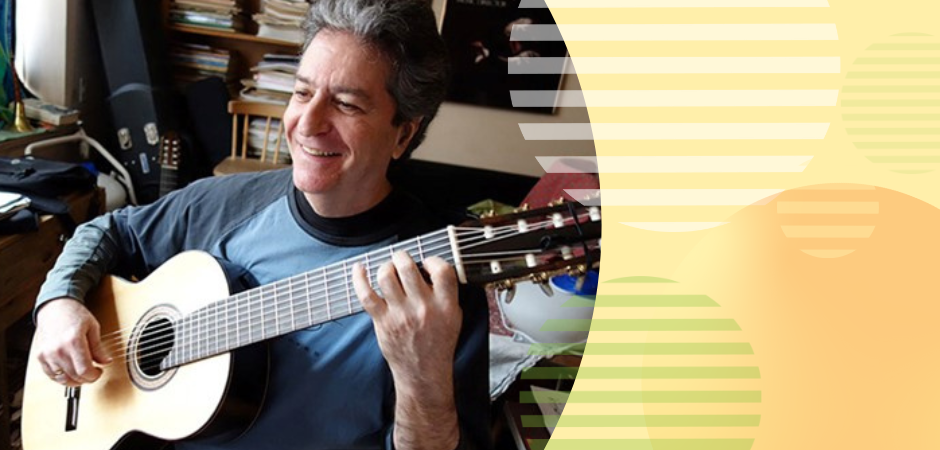Sergio L. Zanotti-Cavazzoni, MD, FCCM, talked with Andrew Schulman about his journey from ICU survivor to medical musician.
Sergio L. Zanotti-Cavazzoni, MD, FCCM, an intensivist based in Houston and a member of the Society of Critical Care Medicine's (SCCM) ICU Liberation Committee, talked with Andrew Schulman, a professional musician and author, about his experience as an ICU survivor. Andrew’s extraordinary journey from critically ill patient to pioneering medical musician offers profound insights into the power of music and family involvement in ICU recovery. He is the first musician accepted as a Professional Healthcare member of SCCM, where he continues his advocacy as a member of the ICU Liberation Committee.
This summary of their interview focuses on Andrew’s near-death experience and the pivotal role his wife Wendy's empowerment and engagement played in his recovery. The full interview can be heard on the
Sound Physicians podcast.
How did you become a patient in the surgical ICU?
I was diagnosed with pancreatic cancer in June 2009 and underwent surgery two weeks later. The surgery went well. During surgery, it was determined that I did not have cancer. After surgery, as I was being wheeled to the surgical ICU, I became unstable for unknown reasons and eventually went into cardiac arrest. I arrived in the ICU clinically dead, and the critical care team resuscitated me. Three hours later, I went into cardiac arrest again. After that, I was massively sick and on life support with mechanical ventilation and multiple drugs to support my blood pressure. On the third day, my lactate was 17 mg/dL and my medical team did not believe I would survive.
The F in the ICU Liberation Bundle stands for family empowerment and engagement. How was your wife involved?
My wife, Wendy, was quite desperate by that third day and was looking for anything to help. I was in a medically induced coma at that time. She had the intuition that, since I’m a musician, the only thing that could save me at that point was music. Wendy asked the ICU physician if she could play music through headphones. The physician agreed that she could play music for 30 minutes but, if there were any signs of distress or my vital signs got worse, she would have to stop.
Fortunately for me, the music that first popped up on my device was my absolute favorite piece: Bach’s St. Matthew Passion, conducted by Leonard Bernstein, a version that I find particularly beautiful. She played it for half an hour. As the music played, my blood pressure stabilized, my lactate started to decrease, and all my clinical parameters started moving in the right direction. I progressively got better.
On the seventh day, they woke me and made me work hard to get off the mechanical ventilator. I skipped the step-down unit, went to the ward, and eventually went home.
How did this experience as a patient impact what you do today?
I first found out what happened with my surgery and that I did not have cancer on the eighth day in the ICU. Several days later, while still in the hospital, I started to listen to music on my device. When the St. Matthew Passion played, I started weeping uncontrollably. At that time, I still didn't know what had happened with the music on the third day in the ICU, but I feel that, as they say, the body remembers.
Wendy told me what had happened in the ICU and, at that moment, I was convinced that music had saved my life. I decided to dedicate the rest of my life to using music as medicine to help critically ill patients. I was a professional guitarist in New York City for 40 years, but that was the moment I began a journey as a medical musician in the ICU, which has continued to this day.
Andrew Schulman's experience as both a critically ill patient and a professional musician has transformed his life and the lives of many ICU patients. His journey not only highlights the importance of family engagement in critical care but also introduces the powerful role of music as a therapeutic tool.
Through his work as a medical musician and his involvement with the ICU Liberation Committee, Andrew continues to advocate for a holistic approach to patient care through the Medical Musician Initiative, which he cofounded in 2018; it empowers families and incorporates innovative therapies such as music. His story, told in detail in his book,
Waking the Spirit: A Musician’s Journey Healing Body, Mind, and Soul, is a reminder of the resilience of the human spirit and the potential for alternative healing practices in modern medicine.

